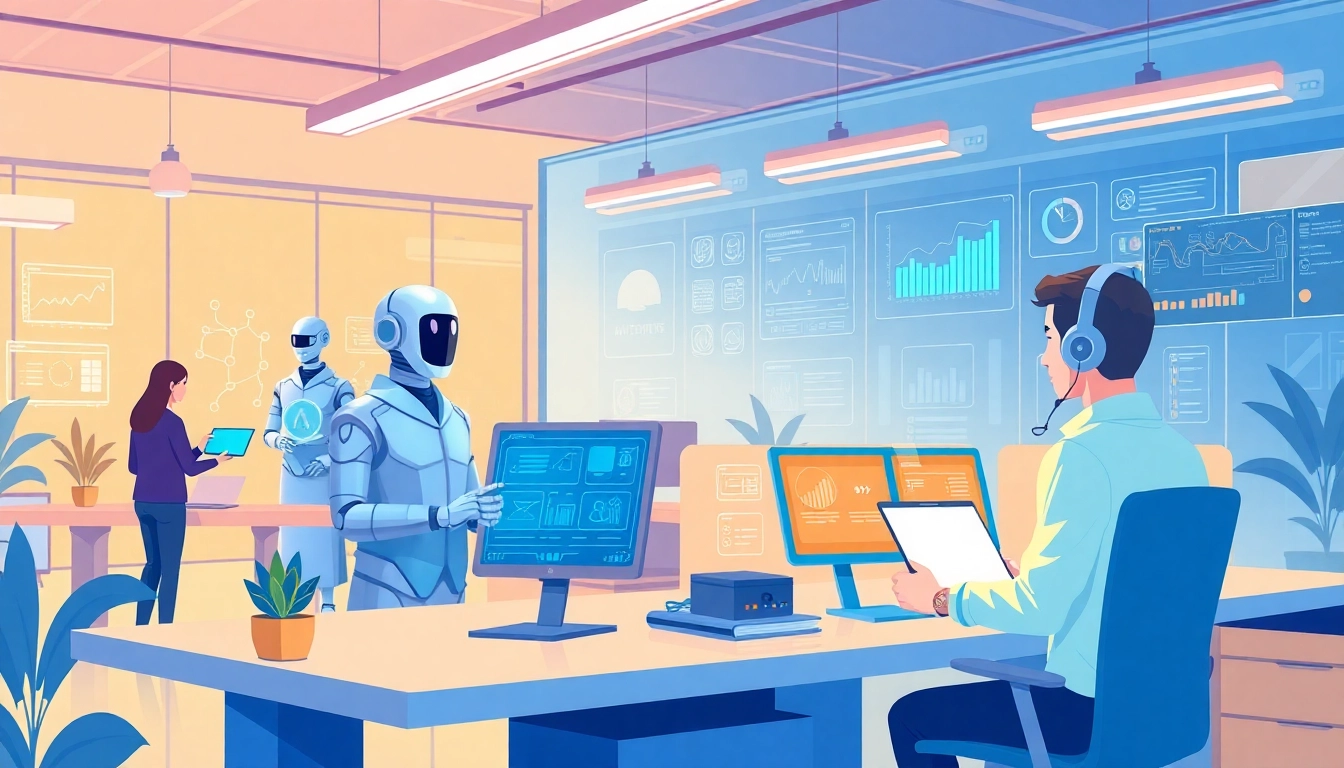Understanding AI Outreach Agents
What Are AI Outreach Agents?
AI outreach agents are innovative tools that leverage artificial intelligence to automate various tasks traditionally handled by sales representatives. These agents are capable of executing manual and repetitive tasks, such as data entry, lead follow-ups, appointment scheduling, and more. This automation enables sales teams to focus on high-value activities, like nurturing relationships and closing deals. As businesses adapt to the increasingly competitive landscape, AI outreach agents provide a critical edge, allowing teams to maximize efficiency and effectiveness.
How They Transform Sales Tactics
The integration of AI outreach agents into sales strategies transforms how businesses engage with prospects and customers. By automating mundane tasks, sales representatives can dedicate their time to strategic activities that require human interaction and creativity. AI outreach agents handle the groundwork—such as analyzing customer data to tailor outreach messages or scheduling meetings at optimal times—enabling sales reps to build stronger, more personal connections with their clients. This shift not only increases productivity but can also lead to enhanced customer experiences and improved sales conversions.
Key Features of Effective AI Outreach Agents
Several key features set effective AI outreach agents apart from conventional tools:
- Automation of Routine Tasks: Automating repetitive tasks like email follow-ups and call scheduling saves time.
- Data Analytics: Advanced algorithms analyze customer interactions and preferences, allowing for personalized outreach.
- Seamless Integration: AI outreach agents can easily integrate with existing CRMs and communication platforms, ensuring a smooth user experience.
- Real-time Learning: These agents adapt and improve their strategies over time through machine learning, leading to increasingly effective outreach.
- Performance Tracking: Effective agents offer robust analytics and reporting features that help teams measure outreach success and optimize strategies.
Benefits of Implementing AI Outreach
Enhancing Productivity for Sales Reps
One of the most significant benefits of implementing AI outreach agents is their capacity to enhance productivity for sales representatives. By automating mundane tasks, agents free sales teams from doing time-consuming administrative work. This newfound time can be redirected towards high-impact activities like crafting personalized messages, establishing connections with prospects, and strategizing service offerings. Studies show that automation can increase sales teams’ productivity by up to 30%, allowing them to focus on closing deals and fostering client relationships rather than getting bogged down by routine tasks.
Data-Driven Decision Making
AI outreach agents equip sales teams with the capability to make informed decisions based on data analysis. They utilize customer data to identify trends and insights, enabling sales reps to tailor their strategies effectively. By leveraging AI technology, organizations can not only identify which outreach strategies are working but can also predict future customer behaviors. This data-driven approach enhances targeting accuracy, leading to higher engagement rates and better conversion outcomes.
Automating Routine Tasks for Efficiency
In the world of sales, routine tasks can consume valuable resources and distract teams from their primary objectives. AI outreach agents automate these mundane activities—such as sending follow-up emails and updating CRM entries—reducing operational friction. When sales teams have one less thing to worry about, they can increase their focus on selling, which translates directly to increased revenues. Furthermore, automation minimizes human errors, enhancing data reliability across the board.
Best Practices for Using AI Outreach Agents
Integrating with Existing Systems
For organizations to fully leverage the power of AI outreach agents, effective integration with existing sales and marketing systems is critical. Smooth integration ensures that these agents can perform optimally without disrupting existing workflows. When selecting an AI outreach agent, businesses should consider solutions that offer API access and compatibility with their current CRM systems, allowing for seamless data exchange and maximizing the benefits of both platforms.
Training Your Team for Maximum Impact
Implementing AI outreach agents without proper training can lead to suboptimal results. Sales teams must be well-versed in utilizing these tools to augment their workflow. Regular training sessions and workshops can help sales reps understand how to maximize the potential of AI outreach agents effectively. Empowering teams to embrace these technologies as allies rather than replacements will ensure a smoother transition and encourage buy-in from all parties involved.
Measuring Success and ROI
To understand the impact of AI outreach agents, it is essential to establish clear metrics for success and a process for measuring return on investment (ROI). Businesses should set specific, quantifiable goals—such as improved lead conversion rates, reduced response times, and increased sales—all of which can be monitored through analytics provided by the AI outreach agents. A systematic approach to measuring performance enables organizations to refine their strategies and continue enhancing their outreach efforts.
Challenges and Solutions in AI Implementation
Common Obstacles in Adoption
Despite the myriad benefits offered by AI outreach agents, organizations may encounter challenges during adoption. Resistance to change is a common hurdle, particularly in teams that are accustomed to traditional sales techniques. To counter this, management should actively promote the advantages of AI tools and provide a platform for open communication regarding concerns. Piloting the AI technology with a small group of enthusiastic representatives can also help ease the transition, showcasing the value of the tool in a tangible way.
Addressing Concerns About AI
Concerns surrounding AI technology often stem from misunderstandings regarding its purpose and capabilities. Teams may fear that AI outreach agents could replace their jobs. Transparent communication regarding the role of AI in augmenting human efforts rather than replacing them is crucial. Companies should emphasize that AI is intended to enhance productivity and efficiency, allowing sales representatives to focus on what they do best: building relationships with customers.
Creating a Sustainable Strategy
To sustainably incorporate AI outreach agents into sales processes, businesses need to develop a long-term strategy. This strategy should take into account the constantly evolving nature of AI technology and the adaptability required to stay competitive. Organizations must remain open to continuous learning and improvements while fostering a culture of innovation. By regularly assessing the effectiveness of AI outreach agents and staying updated on emerging trends, companies can ensure their sales strategies remain relevant.
Future Trends in AI Outreach
The Evolution of AI in Sales
AI in sales is continuously evolving, and future trends promise to reshape the landscape even further. One notable shift is the growing sophistication of AI algorithms, which will enable more personalized and intelligent interactions with customers. Predictive analytics will become more advanced, allowing sales teams to anticipate customer needs and preferences with greater accuracy. The future of outreach will center on building genuine relationships while harnessing AI’s capabilities to streamline processes effectively.
Emerging Technologies and Innovations
As AI technology develops, new tools and innovations will emerge, further enhancing the capabilities of outreach agents. For example, the integration of natural language processing could enable AI agents to engage in more human-like conversations, leading to improved customer engagement. Additionally, the convergence of AI with other technologies, such as augmented reality (AR) and virtual reality (VR), has the potential to create immersive, interactive experiences that can drive sales effectiveness.
Preparing for Changes in the Market
Sales teams must remain agile and flexible to adapt to the rapidly changing market landscape brought about by advancements in AI. Keeping abreast of new technologies and trends will ensure teams can leverage upcoming tools and maintain a competitive edge. Businesses should foster a culture of innovation and invest in training and development for their workforce, allowing for continuous growth and adaptation as market dynamics shift.



